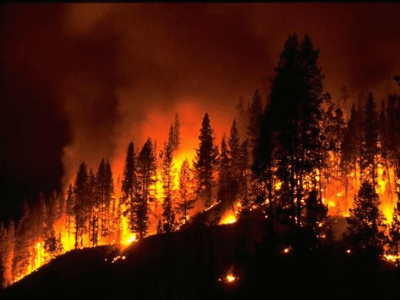The majority of wildfires are caused by humans1. In 2017, there were 63,546 human-caused wildfires that burned nearly 5 million acres.2Natural wildfire outbreaks are typically started by lightning strikes igniting dry vegetation during periods of drought. We see many calls for fire damage restoration caused by brush fires in the dry New England summer months. Oftentimes, these fires begin with the property's shed and quickly spread to surrounding homes. You can help protect your home and community by preparing ahead. These tips review the top causes of wildfires.
Wildfire Prevention Tips:
- Take the time to clean up dead debris like leaves and tree branches around the house that can be turned into kindling by stray embers. Don't forget around the shed and under the deck! Repair loose or missing roof shingles to reduce the risk of fire damage from ember penetration.
- Dispose of smoking materials properly. Use an ashtray or a can of sand. Never throw them directly on the ground or out the car window.
- When choosing landscaping materials for your yard or commercial building, keep fire safety in mind. Choose non-flammable options like stone, gravel, or sand rather than mulch. If you do choose mulch, keep a 3-foot perimeter from the building. If the mulch catches fire (for example, from a poorly discarded cigarette), this perimeter will keep the fire from spreading to the structure.
- Keep campfires small and controllable. Never leave a campfire unattended. Be prepared with a bucket of water or a shovel for dirt to extinguish the fire quickly if it gets out of control. Before leaving the campsite, fully extinguish the fire with water and dirt, stirring the remaining ash until all embers are cool. A good rule of thumb is- extinguish, stir, extinguish again.
- When burning yard debris, do not burn on windy or dry days. Maintain a safe perimeter from vegetation. Keep a hose ready and water down surrounding greenery to keep stray embers from spreading the fire. Burn only dry, dead debris. Freshly trimmed branches or leaves do not burn well and create thick smoke. Be sure to follow your local ordinances. Some cities and towns only allow burning during certain times of the year or with a permit. Also, in some densely populated areas burning is not allowed at all.
We hope you'll find these tips useful. For more helpful information about wildfires, please visit NFPA- Firewise or The U.S. Fire Administration. And know that if you or your clients need help with fire damage restoration, ServiceMaster Dynamic Cleaning is available 24 hours a day, 7 days a week, 365 days a year to help at (800) 865-5157.
Sources:
1- https://www.usfa.fema.gov/prevention/outreach/wildfire.html
2- https://smokeybear.com/en/prevention-how-tos


